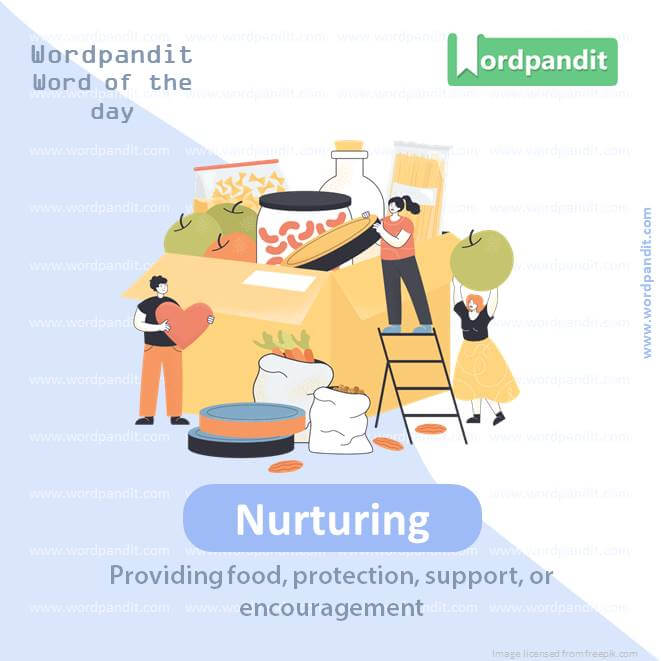Daily Vocabulary Words: List of Daily Used Words in Leading Indian Newspapers
Hi there. Welcome to this special section @ Wordpandit. Our endeavour here is straightforward: highlighting daily vocabulary words that you would come across in leading newspapers in the country. We have included the following newspapers in our selection:
• The Times of India
• The Economic Times
• Hindustan Times
• Mint
• Indian Express
We are putting in extensive work to develop your vocabulary. All you have to do is be regular with this section and check out this post daily. This is your repository of commonly used words; essentially, we are posting a list of daily used words. Hence, this has significant practical application as it teaches you words that are commonly used in leading publications mentioned above.
Visit the website daily to learn words from leading Indian newspapers.

WORD-1: Visceral
CONTEXT: It makes reading Munro a visceral experience, like a conversation with an old friend who knows the many versions of the person one has been.
SOURCE:
EXPLANATORY PARAGRAPH: Imagine eating your favorite food and feeling your stomach growl with hunger or feeling your heart race when you’re scared. That’s like something “visceral.” It means relating to deep, instinctive feelings in your body, like feeling love for your family or fear when you see a spider.
MEANING: Relating to deep inward feelings rather than to the intellect (adjective).
PRONUNCIATION: VIS-er-uhl
SYNONYMS: instinctive, emotional, gut, intuitive, deep-seated, primal
USAGE EXAMPLES:
1. The movie’s powerful imagery evoked a visceral reaction from the audience.
2. She had a visceral fear of spiders since childhood.
3. His visceral response to injustice led him to become an activist.
4. The artist’s work often elicits a visceral response from viewers.

WORD-2: Accolades
CONTEXT: Munro consciously stayed away from an overtly public life, an achievement in itself, given the range of accolades that she garnered, from the Man Booker International Prize to the Nobel Prize.
SOURCE: Indian Express
EXPLANATORY PARAGRAPH: Imagine someone giving you a big round of applause and saying how proud they are of you. That’s like “accolades.” It means praise or recognition for something you’ve done well, like getting a gold star for good behavior or a trophy for winning a race.
MEANING: A tangible symbol signifying approval or distinction
PRONUNCIATION: AK-uh-laydz
SYNONYMS: praise, commendation, applause, recognition, honor, tribute
USAGE EXAMPLES:
1. The actor received many accolades for her performance in the movie.
2. Winning the competition brought him accolades from his peers.
3. The artist’s work earned him critical accolades from art critics.
4. The team’s victory was celebrated with accolades from the fans.

WORD-3: Deteriorated
CONTEXT: Over the next three days, every person who was associated with him for over half a century, paid him their respects. By the fourth day, his condition deteriorated and we flew him back to Delhi and admitted him to AIIMS, where he remained till his last breath.
SOURCE: Indian Express
EXPLANATORY PARAGRAPH: Imagine leaving a banana on the counter for too long until it turns brown and mushy. That’s like something “deteriorated.” It means getting worse over time, like a toy that breaks or a painting that fades because it’s been hanging in the sun too long.
MEANING: Became worse or of a lesser quality (verb).
PRONUNCIATION: dih-TEER-ee-uh-rey-tid
SYNONYMS: worsened, declined, degraded, decayed, degenerated, deteriorated
USAGE EXAMPLES:
1. The old house had deteriorated to the point where it was no longer habitable.
2. Her health deteriorated rapidly after the accident.
3. The quality of the product deteriorated after the company changed suppliers.
4. Relations between the two countries deteriorated following the dispute.

WORD-4: Nurturing
CONTEXT: Through all the upheavals in life, his faith in the Sangh, belief in his party’s ideals, excitement in nurturing young talent, and hope for a bright future for Bihar remained intact.
SOURCE: Indian Express
EXPLANATORY PARAGRAPH: Imagine a plant growing bigger and stronger because you water it every day and give it lots of sunlight. That’s like “nurturing.” It means taking care of something and helping it grow, like giving love and attention to a pet or supporting a friend when they need help.
MEANING: Providing food, protection, support, or encouragement.
PRONUNCIATION: NUR-chuh-ring
SYNONYMS: fostering, cultivating, supporting, encouraging, fostering, promoting
USAGE EXAMPLES:
1. The teacher created a nurturing environment where students felt supported and valued.
2. Her nurturing nature made her the perfect caregiver for the elderly.
3. The organization provides nurturing programs for at-risk youth.
4. He nurtured his passion for music by practicing every day.
WORD-5: Courteous
CONTEXT: He was a shy, soft, dedicated and courteous man. His gentleness was his strength, which was sometimes perceived as his weakness.
SOURCE: Indian Express
EXPLANATORY PARAGRAPH: Imagine someone holding the door open for you with a smile or saying “please” and “thank you” when asking for something. That’s like being “courteous.” It means being polite and respectful to others, like saying nice things and treating people kindly.
MEANING: Polite, respectful, or considerate in manner; showing good manners (adjective).
PRONUNCIATION: KUR-tee-uhs
SYNONYMS: polite, respectful, civil, mannerly, well-mannered, gracious
USAGE EXAMPLES:
1. She thanked the waiter with a courteous smile after he refilled her water glass.
2. The politician was known for his courteous demeanor even in heated debates.
3. It’s important to be courteous to others, even when you disagree with them.
4. The courteous driver waved to let the pedestrian cross the street.
WORD-6: Unopposed
CONTEXT: When the district election officer declared Mukesh Dalal as the winner of the Surat Lok Sabha constituency, he became the first representative to be elected to the yet-to-be-inaugurated 18th Lok Sabha. Dalal won unopposed.
SOURCE: Indian Express
EXPLANATORY PARAGRAPH: Imagine running a race with no one else on the track, so you win automatically. That’s like being “unopposed.” It means not having anyone or anything against you, like being the only one in a game or not having anyone disagree with your idea.
MEANING: Not opposed or challenged by anyone or anything; without opposition (adjective/adverb).
PRONUNCIATION: uhn-uh-POHZD
SYNONYMS: uncontested, unchallenged, unimpeded, unobstructed, unopposed, unassailed
USAGE EXAMPLES:
1. The candidate won the election unopposed because no one else ran against her.
2. The proposal passed unopposed because everyone agreed it was a good idea.
3. His decision to resign went unopposed by the board of directors.
4. The team scored another goal while the opposing team’s defense was unopposed.

WORD-7: Manoeuvres
CONTEXT: It has had to invent ways to better its own attempts to stay in the front, and these manoeuvres have often pushed ethical boundaries.
SOURCE: Indian Express
EXPLANATORY PARAGRAPH: Imagine playing with toy cars and making them move around in different ways, like turning left or right or going fast or slow. That’s like “maneuvers.” It means moving or acting in a skillful and planned way, like making strategic moves in a game or cleverly avoiding a problem.
MEANING: A movement or series of moves requiring skill and care (noun).
PRONUNCIATION: muh-NOO-verz
SYNONYMS: tactics, strategies, operations, moves, actions, maneuvers
USAGE EXAMPLES:
1. The army conducted maneuvers to simulate a battle scenario.
2. The pilot executed a series of maneuvers to avoid the enemy’s missiles.
3. The company’s marketing maneuvers helped it gain a competitive advantage.
4. The gymnast performed intricate maneuvers on the balance beam.
WORD-8: Subversion
CONTEXT: the contemporary weakening of democracy does not take place through overt, bold, and theatrical subversion tactics like coups but by turning democracy against itself by using the rules and institutions in place.
SOURCE: Indian Express
EXPLANATORY PARAGRAPH: Imagine someone secretly trying to change the rules of a game so they always win. That’s like “subversion.” It means trying to overthrow or undermine something, like a government or a set of rules, often by secretly working against it or spreading ideas that go against it.
MEANING: The act of undermining or destabilizing something, such as an established system or authority (noun).
PRONUNCIATION: suhb-VUR-zhuhn
SYNONYMS: undermining, sabotage, destabilization, overthrow, rebellion, treachery
USAGE EXAMPLES:
1. The spy was accused of engaging in subversion against the government.
2. The rebels used propaganda as a tool for subversion against the ruling regime.
3. The company’s competitor attempted to subversion by stealing its trade secrets.
4. The book was banned because authorities believed it advocated subversion.
WORD-9: Innocuous
CONTEXT: this battle is couched in technical language and relies on the letter of the law, it appears innocuous to most people.
SOURCE: Indian Express
EXPLANATORY PARAGRAPH: Imagine someone offering you a cookie, and you take a bite, only to find out it’s just a plain sugar cookie with no surprises. That’s like something “innocuous.” It means harmless or not likely to cause any problems or offense, like a gentle breeze or a friendly smile.
MEANING: Not harmful or offensive; unlikely to cause any adverse effects (adjective).
PRONUNCIATION: ih-NAHK-yoo-uhs
SYNONYMS: harmless, benign, safe, mild, gentle, non-threatening
USAGE EXAMPLES:
1. The spider in the corner of the room was innocuous and posed no threat.
2. His innocuous comment unintentionally offended his friend.
3. The medication had only innocuous side effects.
4. The harmless joke was innocuous and made everyone laugh.
WORD-10: Assiduously
CONTEXT: In this vacuum of intellectual authority, social media — with its global reach and assiduously value-blind approach to content — has powered the rise of a new class of individuals who are able to shape public opinion without necessarily having the depth of knowledge or experience expected from intellectual leaders.
SOURCE: Indian Express
EXPLANATORY PARAGRAPH: Imagine practicing the same dance move over and over until you get it just right, even if it takes a long time. That’s like doing something “assiduously.” It means working very hard and diligently, like studying for a test or practicing a musical instrument every day.
MEANING: With great care, attention, and perseverance; diligently or industriously (adverb).
PRONUNCIATION: uh-SID-yoo-uhs-lee
SYNONYMS: diligently, industriously, conscientiously, tirelessly, persistently, earnestly
USAGE EXAMPLES:
1. She worked assiduously to complete her research project on time.
2. The detective pursued the case assiduously, leaving no stone unturned.
3. He studied assiduously for the exam, determined to get a good grade.
4. The gardener tended to the plants assiduously, ensuring they thrived.
Vocabulary list
In navigating the seas of language learning, a ‘vocabulary list’ can often be a dependable guiding star. These collections of words serve as a focused learning tool, yet the technique of mastering a ‘vocabulary list’ effectively requires more than simple perusal. It calls for a smart, sustained approach that amalgamates understanding, memory, and application.
Exploring a ‘vocabulary list’ should be more than a one-way trip. It ought to be more like a round trip, wherein you learn the words, come back to review them, and then set out again for a new voyage. This repeated interactive way of exploring the ‘vocabulary list’ aids in solid memory retention and effective learning.
Next, while dealing with a ‘vocabulary list’, employing memory-boosting techniques can bolster your retention substantially. Here, mechanisms like spaced repetition systems and flashcards can simplify and streamline the process. Moreover, associating words on your ‘vocabulary list’ with visual cues or personal stories can help your brain make strong connections, strengthening your recall ability.
However, the most crucial aspect of learning from a ‘vocabulary list’ is active application. Conquering a list without using the words in real-world contexts might leave you with fleeting knowledge. Hence, make it a point to integrate these learnt words into your daily interactions, be it on social media, in email exchanges, or casual conversations. The regular utilization reinforces your understanding and brings the ‘vocabulary list’ to life.
Conclusively, the ‘vocabulary list’ is a treasure trove in a language learner’s quest, waiting to be unlocked strategically. Through the trinity of review, memory-enhancing techniques, and active application, one can master any ‘vocabulary list’. So, take charge of your learning journey and set sail with your ‘vocabulary list’, charting the vast and fascinating seas of language.










